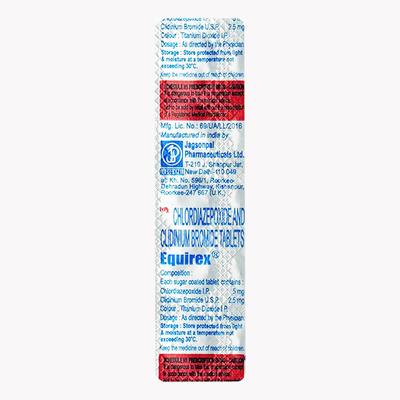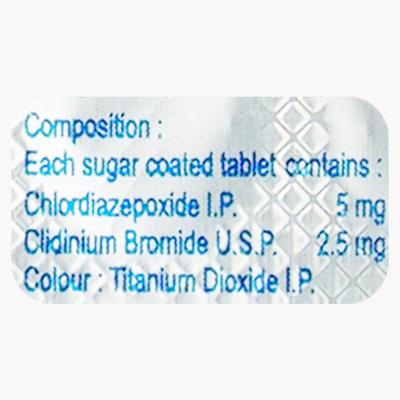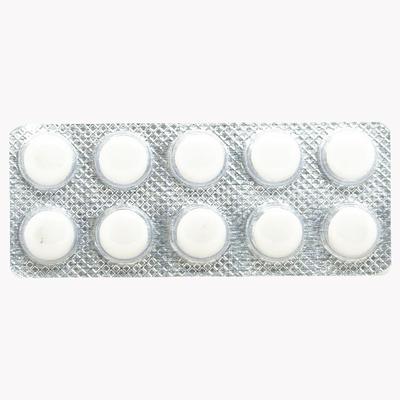

Netmeds First Membership
Quick Links
Introduction About EQUIREX TABLET
EQUIREX TABLET is a combination of Chlordiazepoxide and Clidinium which belongs to the group of medicines called Benzodiazepine and Anticholinergic respectively. It is used to manage emotional and somatic factors (anxiety and depression) in gastrointestinal disorders.
EQUIREX TABLET is used with other medicines for the management of peptic ulcer (sores on the lining of the stomach or intestine), irritable bowel syndrome (an intestinal disorder that causes abdominal pain, gas, diarrhea and constipation) and acute enterocolitis (inflammation of intestines).
EQUIREX TABLET is not recommended for use in patients with liver disease, cardiovascular instability, severe breathing problems and glaucoma. Contact your doctor before taking it.
EQUIREX TABLET should be used with caution in patients with high blood pressure impaired kidney function, fits. Consult your doctor before taking it.
EQUIREX TABLET is not recommended for use in pregnant women. It should be used in breastfeeding women only if clearly necessary. Consult your doctor before taking it.
EQUIREX TABLET should be used with caution in elderly patients. Consult your doctor before taking it. The most common side effects of taking EQUIREX TABLET are dry mouth, nausea, constipation, skin problems, blurred vision, swelling, irregular menstrual cycles etc. Consult your doctor if any of the symptoms worsen.
Uses Of EQUIREX TABLET
Manage:
- Peptic ulcer
- Irritable bowel syndrome
- Acute enterocolitis
How EQUIREX TABLET Works
EQUIREX TABLET contains Chlordiazepoxide and Clidinium. Chlordiazepoxide is a benzodiazepine which affects chemical activity in your brain to help promote sleep and to reduce anxiety and worry and Clidinium bromide works by slowing down the natural movements of your stomach and lower intestine to relieve stomach pain or discomfort. This helps to manage peptic ulcers, irritable bowel syndrome and acute entero-colitis effectively.
How to use EQUIREX TABLET
Take EQUIREX TABLET as advised by your physician. It should be taken before meals and at bedtime. Swallow the medicine with a glass of water. Do not crush or chew the medicine. Your doctor will decide the correct dose and duration for you depending on your age, body weight and disease condition.
Side Effects Of EQUIREX TABLET
Common
- dry mouth, nausea, constipation
- skin problems
- blurred vision
- swelling
- irregular menstrual cycles
- increase and decreased desire for sex (libido)
- problems starting to urinate
- drowsiness
- coordination problems and confusion
Rare
Stop taking EQUIREX TABLET and contact your doctor immediately if you experience any of the following side effects:
- severe allergic reactions such as rashes, hives, swelling of the mouth, tongue and throat, difficulty breathing, nausea and vomiting
- paradoxical reactions such as restlessness, agitation, irritability, rage, aggressive or hostile behaviour, anxiety, false belief, anger, increased muscle spasticity, sleep disturbances, nightmares, hallucinations
- signs of liver problems such as jaundice (yellowing of the skin and eyes), dark urine, light coloured stool, itching all over your body
- slow shallow or weak breathing
How To Manage Side Effects
Constipation
Take fiber rich foods in your diet such as fresh fruits, vegetables and whole grain cereals and drink plenty of fluids. Exercise more regularly and stay active. Contact your doctor if constipation persist.
Dizziness Or Drowsiness
Try to rest and relax. Get enough sleep. Avoid driving or operate any machines while you are feeling drowsy. Do not drink alcohol, as it can aggravate your drowsiness. Contact your doctor if your drowsiness did not improve.
Dry Mouth
Dry mouth can be managed by chewing sugar-free gum or sucking on sugar-free hard candies to stimulate the flow of saliva. Sip water at regular intervals of time. Do not use mouthwashes that contain alcohol because they can be drying. Consult your doctor if the dry mouth gets worse.
Nausea And Vomiting
Take EQUIREX TABLET, with or just after a meal. Stick to simple meals. Avoid eating oily or spicy food. Contact your doctor if your nausea did not improve.
Warning & Precautions
Pregnancy
Consult your doctorEQUIREX TABLET is not recommended for use in pregnant women especially during the first trimester as it may cause harm to the unborn baby. Consult your doctor before taking it.
If you become pregnant during management with this medicine, contact your doctor immediately.
Breastfeeding
Consult your doctorEQUIREX TABLET should be used in breastfeeding women only if clearly necessary as it may pass through your breast milk and may cause sedation in infants. Talk to your doctor about the best way to feed your baby if you take this medicine. EQUIREX TABLET may decrease the amount of breast milk your body makes.
Driving and Using Machines
Use with CautionEQUIREX TABLET may cause sleepiness or dizziness and can slow your thinking and motor
Alcohol
Monitoring requiredAvoid consumption of alcohol while taking EQUIREX TABLET because it may worsen sleepiness and dizziness.
Kidney
Use with CautionEQUIREX TABLET should be used with caution in patients with impaired kidney function. Consult your doctor before taking it.
Liver
ContraindicatedEQUIREX TABLET is not recommended for use in patients with liver disease. Consult your doctor before taking it.
Allergy
ContraindicatedDo not take EQUIREX TABLET if you are allergic to Chlordiazepoxide and Clidinium or any other ingredients of this medicine.
Lungs
Consult your doctorEQUIREX TABLET is not recommended for use in patients with severe respiratory insufficiency (breathing problems). Contact your doctor before taking it.
EQUIREX TABLET should be used in patients with severe chronic obstructive pulmonary disease only if clearly necessary. Contact your doctor before taking it.
Heart Disease
Consult your doctorEQUIREX TABLET is not recommended for use in patients with cardiovascular instability. Consult your doctor before taking it.
It should be used with caution in patients with high blood pressure.
Others
EQUIREX TABLET is not recommended for use if you:
- have history of drug abuse or dependence
- have glaucoma (increased eye pressure)
- have hiatal hernia with (a condition where the top of your stomach bulges through an opening in your diaphragm) with acid reflux
- have intestinal obstruction
- have myasthenia gravis (muscle weakness)
- have prostatic hypertrophy (enlarged prostate gland)
- have benign bladder neck obstruction (blockage of bladder causing problems with urination)
- have ulcerative colitis (inflammation of colon and rectum)
- have psychotic disorders
Before taking EQUIREX TABLET, inform your doctor if you:
- have hyperthyroidism (overactive thyroid)
- have eye problems
- have coordination problems
- have bleeding problems
- have xerostomia (dry mouth)
- have memory problems
- have impaired thinking, confusion or any other type of brain damage
- have fits
- have lactose intolerance
Use in paediatrics:
The safety and effectiveness of EQUIREX TABLET in children is not established. Contact your doctor before taking it.
Use in geriatrics:
EQUIREX TABLET should be used with caution in elderly patients aged 65years and above due to increased risk of drowsiness, ataxia (impaired coordination) and confusion. Consult your doctor before taking it.
Interactions
A. Drug - Drug interactions:
Before taking EQUIREX TABLET, inform your doctor if you are taking any of the following medicine:
- opioids (medicines used to manage severe pain) Ex. morphine
- antidepressants (medicines used to manage depression) Ex. selegiline, nefazodone
- sedative antihistamines (medicines used to manage allergies) Ex. clemastine
- anticonvulsants (medicines used to manage fits) Ex. phenytoin
- antipsychotics (medicines used to manage psychoses) Ex. chlorpromazine, haloperidol
- anaesthetics (medicines used to produce temporary loss of consciousness) Ex. lidocaine
- oral anticoagulants (medicines used to thin the blood) Ex. warfarin
- cimetidine (used to manage gastric ulcers)
- erythromycin (used to manage bacterial infections)
- ketoconazole, itraconazole (used to manage fungal infections)
- efavirenz (medicines used to manage HIV/AIDS)
Overdosage:
If you or anyone else accidentally take too much of EQUIREX TABLET, consult your doctor immediately or visit the nearby hospital. Signs and symptoms include sleepiness, confusion, difficulty in urination, constipation, severe drowsiness, severe dryness of mouth, nose or throat, fast heartbeat, unusual warmth, dryness, flushing of the skin, coma and decreased reflexes, restlessness and excitement to psychotic behaviour, flushing, tachycardia, fall in blood pressure, respiratory failure, paralysis and coma.
Synopsis
| Drug | : | Chlordiazepoxide and Clidinium |
| Pharmacological Category | : | Benzodiazepines and Anticholinergics |
| Therapeutic Indication | : | Peptic ulcer, Irritable bowel syndrome, Acute enterocolitis |
| Dosage Forms | : | Tablet |
More Information
- Keep EQUIREX TABLET out of reach of children
- Store EQUIREX TABLET below 30°C
FAQs About EQUIREX TABLET
Q: What happens if you miss a dose of EQUIREX TABLET?
A: If you forget to take EQUIREX TABLET at the correct time, take it as soon as you remember. If it is almost time for the next dose, skip the missed dose and continue to take the next dose at the usual time. Do not take a double dose to make up for a forgotten dose.
Q: Is EQUIREX TABLET a habit-forming drug?
A: EQUIREX TABLET when used in long-term even at recommended dosages, increase the risk of abuse, misuse and addiction, which can lead to overdose and death. Signs and symptoms of EQUIREX TABLET abuse, misuse and addiction include abdominal pain, loss of memory, loss of appetite, anxiety, aggression, impaired coordination, blurred vision, confusion, depression, disinhibition, disorientation, dizziness, excitement, impaired concentration and memory, indigestion, irritability, muscle pain, slurred speech, tremors and vertigo. Severe reactions include delirium (change in mental abilities), paranoia (irrational suspicion), suicidal ideation and behaviour, fits, coma, breathing difficulty and death. Contact your doctor immediately if you experience any of these symptoms.
Q: Does EQUIREX TABLET cause constipation?
A: Yes. EQUIREX TABLET may cause constipation. Take fiber rich foods in your diet such as fresh fruits, vegetables and whole grain cereals and drink plenty of fluids. Exercise more regularly and stay active. Contact your doctor if constipation persist.
Q: Can I stop EQUIREX TABLET suddenly?
A: Do not stop EQUIREX TABLET suddenly as it may cause serious and life-threatening side effects, including unusual movements, responses or expressions, seizures, sudden and severe mental or nervous system changes, depression, seeing or hearing things that others do not see or hear, an extreme increase in activity or talking, losing touch with reality and suicidal thoughts or actions. Your doctor will gradually reduce your dose in order to avoid these reactions.
Q: Does EQUIREX TABLET cause dental problems?
A: Yes. If you use EQUIREX TABLET for a long time, it may cause you to produce less saliva or it might stop your saliva production. This may cause dental problems such as cavities, swollen gums or gingivitis, oral thrush and/or discomfort. Consult your doctor for advice before taking EQUIREX TABLET.
References
1. KD. Tripathi. Anticholinergic Drugs and Drugs Acting on Autonomic Ganglia. Essentials of medical pharmacology. Seventh edition. 2013. Page – 117.
2. Puasripun S, Thinrungroj N, Pinyopornpanish K, Kijdamrongthum P, Leerapun A, Chitapanarux T, Thongsawat S, Praisontarangkul OA. Efficacy and Safety of Clidinium/Chlordiazepoxide as an Add-on Therapy in Functional Dyspepsia: A Randomized, Controlled, Trial. NIH National Library of Medicine, National Center for Biotechnology Information. PubMed Central. April 2020. [Accessed on 30th January 2023]. https://www.ncbi.nlm.nih.gov/pmc/articles/PMC7176503/
3. Eskander EF, Abd-Rabou AA, Ahmed HH. The impact of digestive and colon drugs on the human hormones profile. NIH National Library of Medicine, National Center for Biotechnology Information. PubMed Central. March 2013. [Accessed on 30th January 2023] https://www.ncbi.nlm.nih.gov/pmc/articles/PMC3783924/
4. Chlordiazepoxide and Clidinium. Daily Med: National Library of Medicine: National Institute of Health. [Revised in January 2023] [Accessed on 30th January 2023] https://dailymed.nlm.nih.gov/dailymed/lookup.cfm?setid=f99ebf66-f207-4a97-9666-4da1d72b061c
5. AA Pharma Inc. Chlordiazepoxide hydrochloride and Clidinium Bromide. [Revised in December 2021] [Accessed on 30th January 2023] https://www.aapharma.ca/downloads/en/PIL/2021/Chlorax_PM_EN.pdf
6. Dr. Reddy’s Laboratories Inc. Chlordiazepoxide hydrochloride and Clidinium Bromide. [Revised in March 2021] [Accessed on 30th January 2023] https://www.drreddys.com/pil/Chlordiazepoxide-Hyd-Clidinium-Bromid-Cap_Outsert-v_5-PI.pdf
Useful Diagnostic Tests
- Complete blood count
- Liver function test









